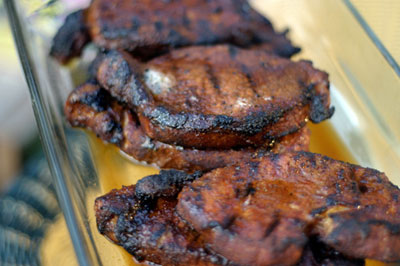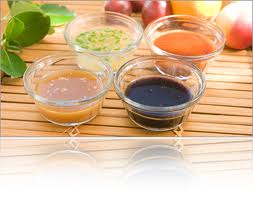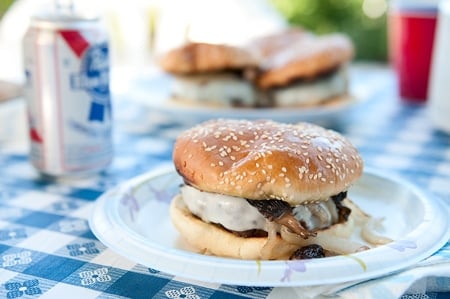Marinades
Marinades are flavor-infusing liquids best suited for tougher cuts of meat. In addition to herbs, condiments, spices, and oils, marinades typically include an acid, like lemon juice, wine, vinegar, even dairy.
Adding sweet ingredients to the marinade can help form appealing caramelized, crispy coatings on grilled meats. The acids in the lemon juice, wine, vinegar, butter milk, etc will actually cook the protein in the meat by chemical reaction.
Always marinate in the refrigerator. And remember, if you’re basting with a liquid in which raw meat marinated, do not apply it during the last three minutes of grilling.
The good news:
Chicken, turkey and fish will take on marinade flavors much more quickly and effectively than red meats. Fish only need to marinate for 30 minute to an hour. Chicken and turkey 2 to 3 hours. Red meats need at least 24 hours to work at all. The more acid in the marinade the better and quicker it will work.
The bad news:
Marinades only penetrate the meat 1/8 inch at the most no mater how long you soak them. Think of marinades as a sauce and don’t waste money on expensive ingredients for your marinades. If you use sugar the sugar will tend to burn on the surface of the meat. If you like charred meat, fine. Don’t use alcohol either. The alcohol will only cook the surface of the meat sealing it from further penetration of the other flavors. If you use salt in the marinade then you are actually brining your meat. See Brines below.
Brines
Before grilling, rinse brined meat to remove excess salt and dry it with paper towels.
Remember high school chemistry? Yeah, me neither. But I do remember something about osmosis. But I remember that in osmosis through a semi permeable membrane like the flesh of the meat, water or other liquid will flow from a lower concentration of salt to a higher one, back and forth until the concentrations are equal. So first water flows out of the meat and salt flows in which starts to break down the proteins in the cells. Additonal water will flow into the meat as the protein breaks down causing the meat to be more moist.
The brine can also be used as a vehicle to carry other flavors into the meat with the dissolved salt. Hence the sugar (to balance the salt) and other flavors that will dissolve in water.
Obviously, there’s more going on than simple osmosis. It is true that salt enters the meat (it tastes more salty after brining). But why is it also more juicy? Well, when water flows out of the meat, salt flows in and begins to break down some of the proteins in the cells. In the broken down state, the molecules become more concentrated and the solute levels rise within the meat. This causes additional water to flow into the meat.
How Stuff Works has a short article describing osmotic pressure with a diagram that may be helpful to visualize the water flow.
What has happened is that through brining, we’ve caused a state change in the cells so that they will draw and hold more water than before. As we cook the meat, the heated proteins will begin to draw in tighter and squeeze out water, but, hopefully, enough water will remain to produce a juicy, tender piece of meat.
Rubs
Rubs are seasoning mixtures rubbed on meats before grilling to add spicy or smoky flavors. The best rubs enhance the flavor of the meat without being overbearing and are often blends of strong and mild spices and herbs. When oil or another wet substance is included, it is called a wet rub. A little moisture helps the rub adhere to the meat.
Rubs are an easy way to infuse the surface of your grilled meats with exciting ethnic flavors–from Cajun to Korean.
Setting aside rubbed meats for anywhere from 30 minutes to overnight allows the spices to permeate the meat as much as possible.
Rubs are most effective when used on slow cooking meat as opposed to a fast grilling method. Slow cooking allows the meat’s juices to blend with the rub while high heat grilling only burns the rub on the surface.
Good luck with your flavoring methods. Here at the Fat Farm we almost always use either McCormik’s lemon/pepper or just plain salt and pepper. We let the meat speak for it self – jughandle






